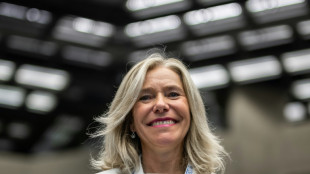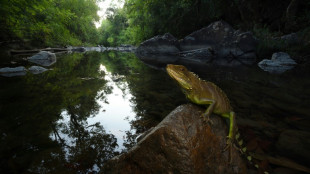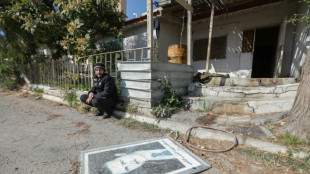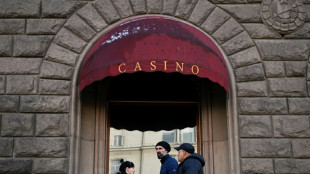
-
 Global green energy push likely to continue despite Trump climate retreat: UN
Global green energy push likely to continue despite Trump climate retreat: UN
-
Shooting, explosions in Jenin as Israel presses raid

-
 Spotlight on risk management as skiers tackle notorious Kitzbuehel downhill
Spotlight on risk management as skiers tackle notorious Kitzbuehel downhill
-
Rare wildlife species found in Cambodian national park

-
 EU Russia hawks back Trump call to boost defence spending
EU Russia hawks back Trump call to boost defence spending
-
Trump puts US govt diversity workers on leave, calls bishop 'nasty'

-
 Semi-finalist Shelton 'shocked' by 'embarrassing' Melbourne TV hosts
Semi-finalist Shelton 'shocked' by 'embarrassing' Melbourne TV hosts
-
Sinner races into semis as Swiatek closes on first Melbourne crown

-
 Syria's military hospital where detainees were tortured, not treated
Syria's military hospital where detainees were tortured, not treated
-
Prince Harry settles lawsuit against Murdoch's UK tabloids

-
 Sinner demolishes De Minaur to set up Melbourne semi with Shelton
Sinner demolishes De Minaur to set up Melbourne semi with Shelton
-
Stock markets diverge tracking Trump plans

-
 Sudan 'political' banknote switch causes cash crunch
Sudan 'political' banknote switch causes cash crunch
-
Malaysia's Anwar says don't single out China in sea tensions

-
 EU's top diplomat backs Trump call to boost defence spending
EU's top diplomat backs Trump call to boost defence spending
-
Simmering anger as Turkey begins burying 76 fire victims

-
 Masa Son, Trump's Japanese buddy with the Midas Touch
Masa Son, Trump's Japanese buddy with the Midas Touch
-
Borussia Dortmund sack Sahin after Champions League setback

-
 US govt workers in diversity jobs to be put on leave as programs ordered shut
US govt workers in diversity jobs to be put on leave as programs ordered shut
-
Shelton grinds past Sonego into Australian Open semi-final

-
 Borussia Dortmund sack coach Nuri Sahin after Champions League setback
Borussia Dortmund sack coach Nuri Sahin after Champions League setback
-
Markets rise after Trump AI pledge but China tariff fears return

-
 'Did not push hard enough': Navalny lawyer speaks of regrets
'Did not push hard enough': Navalny lawyer speaks of regrets
-
Bulgaria court ruling turns spotlight on gambling addiction

-
 Inoue focused on Korean with bright lights of Vegas on horizon
Inoue focused on Korean with bright lights of Vegas on horizon
-
Mauricio Funes: journalist turned El Salvador president

-
 Navarro urges rule change after double-bounce furore in Melbourne
Navarro urges rule change after double-bounce furore in Melbourne
-
Asian traders cheer Trump AI pledge but China tariff woes return

-
 Lesotho's king pitches green energy to Davos elites
Lesotho's king pitches green energy to Davos elites
-
Buttler rejects calls for England to boycott Afghanistan match

-
 'I believe': Swiatek surges into Australian Open semi with Keys
'I believe': Swiatek surges into Australian Open semi with Keys
-
Indonesia rescuers search for survivors as landslide kills 19

-
 Triple-doubles for Jokic and James fuel lopsided NBA wins
Triple-doubles for Jokic and James fuel lopsided NBA wins
-
Five things about the 2025 World Rally Championship

-
 'Love for humanity': Low-crime Japan's unpaid parole officers
'Love for humanity': Low-crime Japan's unpaid parole officers
-
Indonesia rescuers search for survivors as landslide kills at least 17

-
 Trump targets opponents, faces criticism from cathedral pulpit
Trump targets opponents, faces criticism from cathedral pulpit
-
S. Korea to overhaul some airports after Jeju Air crash

-
 Resilient Keys 'really proud' to be back in Melbourne semis
Resilient Keys 'really proud' to be back in Melbourne semis
-
Bloodied Welsford fights back from crash to win another Tour stage

-
 Swiatek sweeps into Melbourne semis, Sinner faces home test
Swiatek sweeps into Melbourne semis, Sinner faces home test
-
Rampant Swiatek sweeps into Australian Open semi-final with Keys

-
 Lanterns light up southern Chinese city ahead of Lunar New Year
Lanterns light up southern Chinese city ahead of Lunar New Year
-
'Worst ever' Man Utd turn to Europa League as saving grace

-
 Brazil saw 79% jump in area burned by fires in 2024: monitor
Brazil saw 79% jump in area burned by fires in 2024: monitor
-
Resilient Keys beats Svitolina to reach Australian Open semi-finals

-
 Most Asian markets rise after Trump AI pledge but China tariff woes return
Most Asian markets rise after Trump AI pledge but China tariff woes return
-
Djokovic mentally ready for Zverev but worried about creaking body

-
 As Trump takes aim at EVs, how far will rollback go?
As Trump takes aim at EVs, how far will rollback go?
-
No home, no insurance: The double hit from Los Angeles fires


Ukraine war sends Western anxiety soaring on back of pandemic
Just as millions of people dared to hope a two-year pandemic was receding, war broke out in Ukraine, triggering a new surge of anxiety in Western Europe and fears about wider conflict -- or worse.
As the West faces a possible new Cold War and warnings about heightened nuclear threats fill social media and the airwaves, many people are struggling with the sudden new world order, even if they are living thousands of miles away from the frontlines in Ukraine.
Chogwu Enape, a 29-year-old policy researcher based in Paris, said she hadn't been able to sleep properly since Russia invaded Ukraine last week.
"I'm worried about innocent people dying needlessly and I am worried that this crisis will morph into World War III," Enape told AFP.
"Every single scroll on social media brings news or images of the invasion. The racism that Africans are facing while trying to flee brought it home for me," she said.
"That could be me."
Psychologists have voiced particular concern about the effect of the latest global crisis on children and young people, even those living in relative comfort in peaceful countries.
"Children are constantly absorbing things they read, see and hear and it's completely natural for them to be picking up on the situation in Ukraine and feeling anxious," explained Vivian Hill, a psychology professor at University College London.
Some therapists and counsellors have reported distress among their clients.
"Almost every person I have encountered has been affected" by the war, said psychotherapist Nilufar Ahmed, who is also a psychologist at Britain's University of Bristol.
Others have turned to charity for help.
"We've heard from a number of people who are distressed by what they are seeing and hearing about the war in Ukraine, and who want to share their feelings with us," a spokesman for British mental health charity Mind, which runs a helpline, told AFP.
Anxiety and depression already rose by "a massive 25 percent" during the first year of the coronavirus pandemic, the World Health Organization said on Tuesday, adding that young people were the worst hit.
- 'Accumulation of crises' -
Michelle Nealon, president of the Chicago School of Professional Psychology, said that as many countries loosened Covid restrictions, "there was some light at the end of this gruelling tunnel".
"Then war broke out, violent images of missile attacks and deceased soldiers lying on the streets flooded our social media and TV screens, threat of nuclear attacks hung in the air, and we watched economies scramble in the aftermath," she said.
"There is a feeling of there is only so much that one can handle."
Antoine Pelissolo, a psychiatrist at France's Henri-Mondor University Hospital, said some people felt "a sense of despair in the face of an accumulation of crises, with the impression they will never be able to get out of them".
"For younger generations in particular, this brutal confrontation with the reality of war, and therefore possible death... is a shock that can cause anxiety and a strong feeling of insecurity."
Ahmed pointed out that many in the West are responding differently to the Ukraine war than to conflicts in the Middle East or Africa.
"The current war is resonating more in Europe because the Ukrainians look like other Europeans more than the refugees that have dominated the public psyche, who tend to be racialised and constructed as different," Ahmed said.
- How to help -
What can we do to manage our mental health in a time of crisis?
For children, British psychotherapist Noel McDermott advised "keeping life 'normal' with structure and routine" and stressed the importance of school in helping them overcome frightening events.
Hill advised against avoiding the issue with children.
"Listen to their worries and provide honest answers to their questions (while trying) to give details at an age-appropriate level."
For adults, Pelissolo recommended relaxation, meditation and physical activity to cope with rising anxiety.
Nealon said "sleeping well, eating a healthy diet and getting daily exercise are essential for keeping us physically and emotionally strong".
Donating to a charity "would make a real difference and will make you feel better too", Ahmed said.
All the experts advised children and adults to limit exposure to news about the war.
"Don't just switch off the news -- do something nourishing for yourself. Phone a loved one, go for a walk with a friend," Ahmed recommended.
"Whenever you do look at the news, try to stick to reliable, trusted news sources that don't engage in 'What ifs?'", the Mind spokesman advised.
"Try to regularly ask yourself, 'Is this helping me or am I doom scrolling?'"
D.Johnson--AT
